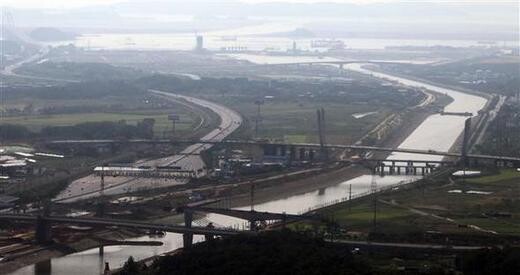hankyoreh
Links to other country sites 다른 나라 사이트 링크
[Editorial] Accountability for the pound-foolish Seoul-Incheon Canal

An internal Korea Water Resources Corporation (K-water) report confirms that its Seoul-Incheon Canal project is not economically feasible. Commissioned from the corporation by the Korea Maritime Institute (KMI), the report came out two years ago in 2009 and presents a point-by-point refutation of the December 2008 anticipated demand report by the Korea Development Institute (KDI) that served as a basic for the project’s execution, with its benefit-cost ratio of 1.07. Holding each of these contrasting reports in either hand, it is clear that K-water’s behavior has been appalling. K-water used one as a basis for carrying the effort out and the other as a basis for loss compensation.
According to the KMI’s report on the calculation of dock usage fees, KDI’s traffic volume predictions were completely groundless from start to finish. This is an obvious conclusion to reach, given how the earlier report included in the traffic volume used car freighters that had no possibility of accessing the docks, inflated the dwindling demand for sand to a ridiculous degree, and assumed the relocation of freight from surplus facilities at the nearby Incheon and Pyeongtaek-Dangjin Ports. In feigning innocence despite having this report in hand, K-water provided a classic example of moral hazard at a public corporation.
Regardless of who writes the check, the construction costs on the canal are ultimately shifted to the people of South Korea. Any additional losses that arise also have to be offset by taxpayers. This received no attention despite being something urgently in need of adjustment. One has to ask just what K-water was thinking. On top of that, K-water has reportedly recently requested around 530 billion won ($479.6 million) from the government to cover anticipated losses. This is the same corporation that initially boasted about how it would be handling all of the construction and operation, and how there would be no burden for taxpayers.
The responsibility, however, lies ultimately with South Korea’s construction community, including President Lee Myung-bak. From the time the idea of the Seoul-Incheon Canal was first broached in 1987, K-water and the then-Ministry of Construction and Transportation (current Ministry of Land, Transportation and Maritime Affairs) moved as one. The benefit-cost ratio presented by K-water at the time was no less than 2.08, and the ministry upped this to 2.2 in 1996.
After continued allegations of manipulation and distortion, KDI was pressured into producing three different investigation reports in 2002, finally giving them the findings they wanted. The Board of Audit and Inspection (BAI), however, starkly overturned these in a 2003 audit. Silent after that, the construction community pressured KDI once again after the Lee administration took office, using the new results as a basis for carrying out the effort.
Costing somewhere around 2 trillion won, the Seoul-Incheon Canal is already over 96 percent complete. At this point, the project cannot be stopped, but neither can we simply make up for the deficit incurred by people who fattened their own bellies while making a mockery of the South Korean public. Nor can we merely lament the situation. We should be starting preparations immediately to hold those involved civilly and criminally liable.
Please direct questions or comments to [englishhani@hani.co.kr]
Editorial・opinion
![[Guest essay] The real reason Korea’s new right wants to dub Rhee a founding father [Guest essay] The real reason Korea’s new right wants to dub Rhee a founding father](https://flexible.img.hani.co.kr/flexible/normal/500/300/imgdb/original/2024/0423/8317138574257878.jpg) [Guest essay] The real reason Korea’s new right wants to dub Rhee a founding father
[Guest essay] The real reason Korea’s new right wants to dub Rhee a founding father![[Column] ‘Choson’: Is it time we start referring to N. Korea in its own terms? [Column] ‘Choson’: Is it time we start referring to N. Korea in its own terms?](https://flexible.img.hani.co.kr/flexible/normal/500/300/imgdb/original/2024/0423/3617138579390322.jpg) [Column] ‘Choson’: Is it time we start referring to N. Korea in its own terms?
[Column] ‘Choson’: Is it time we start referring to N. Korea in its own terms?- [Editorial] Japan’s rewriting of history with Korea has gone too far
- [Column] The president’s questionable capacity for dialogue
- [Column] Are chaebol firms just pizza pies for families to divvy up as they please?
- [Column] Has Korea, too, crossed the Rubicon on China?
- [Correspondent’s column] In Japan’s alliance with US, echoes of its past alliances with UK
- [Editorial] Does Yoon think the Korean public is wrong?
- [Editorial] As it bolsters its alliance with US, Japan must be accountable for past
- [Guest essay] Amending the Constitution is Yoon’s key to leaving office in public’s good graces
Most viewed articles
- 1Samsung barricades office as unionized workers strike for better conditions
- 2[Editorial] Japan’s rewriting of history with Korea has gone too far
- 3[Column] The clock is ticking for Korea’s first lady
- 4[Column] The president’s questionable capacity for dialogue
- 5[Reporter’s notebook] Did playing favorites with US, Japan fail to earn Yoon a G7 summit invite?
- 6Korean government’s compromise plan for medical reform swiftly rejected by doctors
- 7Why Korea shouldn’t welcome Japan’s newly beefed up defense cooperation with US
- 8Senior doctors cut hours, prepare to resign as government refuses to scrap medical reform plan
- 9[Column] ‘Choson’: Is it time we start referring to N. Korea in its own terms?
- 10[Guest essay] The real reason Korea’s new right wants to dub Rhee a founding father